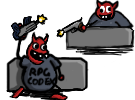Yeah, where I have a lot of criticisms to throw at the plot structure, the execution, the tone of the writing, etc, etc, the companions were marvellous.
In a word, most people who don't like POE's characters simply don't jibe with the recessive, understated style that governs them - because melodrama has been the universal style governing how CRPGs are written for basically 99% of them.
Eder manages to functionally fulfill the "agreeable fighter NPC that can fit into any party" without becoming an annoying soapy-melodrama Carth; he manages to go through a story arc about a lost bro and guilt over the past without getting into predictable emo sob stories, grimdark try-hard Cure album "you do not understand my pain", or any such wildness. He responds in a complex and realistic way - sometimes joking, sometimes wishing he could sweep it all under a rug, sometimes getting a bit desperate about it. Sagani & Kana a lot of people say is 'boring', but usually this comes down to the argument that nothing EPIC happens in their stories. In fact, for any attentive player, they are the best mirrors for the themes of the POE main plot and the world and the Watcher: the idea that sometimes you can never discover the lost truths, recover the lost artefacts, set the record straight, get a revelation that puts all the pieces in the puzzle together, etc. That sometimes, the uncertainty and anxiety that you started your journey with is something that you can never get rid of, and what matters is how you still make your choices, which will define who you are, not the secrets or the missing soul.
Durance and the Grieving Mother are the more traditionally melodramatic and actively expressive types; those who broadcast their problems and mystery a mile away, and invite the player to journey through their intensified rendition of the themes. And it's good that they are there, quite apart from the fact that MCA wrote them, to have a bit of contrast.
Thaos is terribly written all the way through, and only really gets compelling dialogue at the very end, but as Crichton says, the other major characters tend to do well. Maybe a consequence of how little cross-editing was possible, so that characters as mostly handled by a single writer come out well but the whole plot creaks and trips a lot?



























